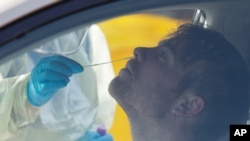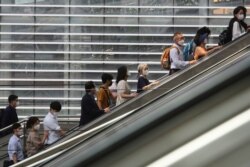New Zealand is requiring everyone using public transport and traveling on airplanes to wear face coverings starting Monday, while enhanced restrictions aimed at stopping the spread of a coronavirus outbreak in Auckland are being extended through Sunday.
Auckland, the country’s biggest city, has been dealing with a collection of cases after the country went more than 100 days since declaring no community transmission of the virus. Health officials reported eight new cases linked to the Auckland cluster Monday.
“We know masks protect you and the people around you,” Prime Minister Jacinda Ardern said at a briefing Monday.
She said she understands the frustrations of people in other parts of the country where there are not any new cases being reported yet some restrictions remain in place. But she said with people allowed to travel between regions, the tradeoff in allowing such economic activity is requiring social distancing and placing limits on mass gatherings.
In South Korea, where officials are also trying to get control of an outbreak centered in the Seoul area, the government imposed an order requiring masks in both indoor and outdoor locations on Monday.
New restrictions banning in-person church services and closing nightclubs, buffets and cyber cafes are in effect throughout South Korea.
The Korea Centers for Disease Control and Prevention reported 266 new cases Monday, with 202 located in the Seoul area. There are also infections in other major cities such as Busan, Daejeon and Sejong.
Mexico, which last week cited a sustained decline in its daily coronavirus toll, reported Sunday 266 new deaths, the lowest number it has seen in more than two months.
The country has more than 60,000 total deaths, trailing only the United States and Brazil.
U.S. President Donald Trump announced Sunday the Food and Drug Administration has given emergency use authorization for the use of convalescent plasma to treat COVID-19 patients.
The antibody-rich plasma is taken from people who have already recovered from the coronavirus and transferred into patients suffering from COVID-19.
FDA Commissioner Stephen Hahn said the agency analyzed information from 20,000 of the 70,000 patients who had received the treatment, as well as other studies, and determined it was worth granting the emergency authorization.
Some scientists have been more cautious about supporting the treatment, saying the results for it are mixed and that there is no proof yet that it works against COVID-19.
As communities all over the world weigh how quickly to lift certain restrictions, including those that involved closing schools, the top medical officials in Britain issued a statement Sunday saying children were more likely to be harmed by remaining out of school than by being exposed to the coronavirus.
“Very few, if any, children or teenagers will come to long-term harm from COVID-19 due solely to attending school,” the top medical officers in England, Scotland, Northern Ireland and Wales said in the statement. “This has to be set against a certainty of long-term harm to many children and young people from not attending school.”

